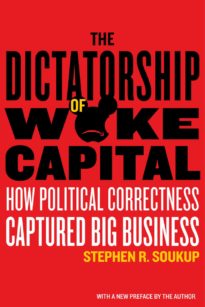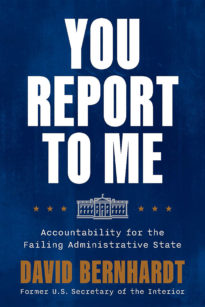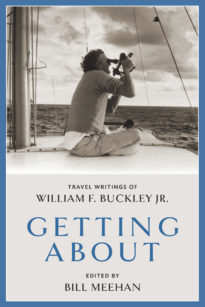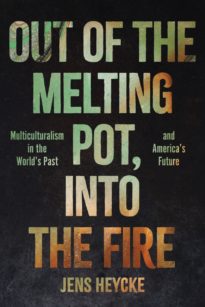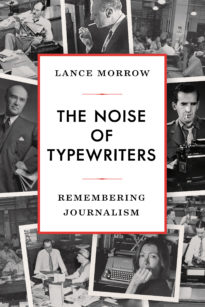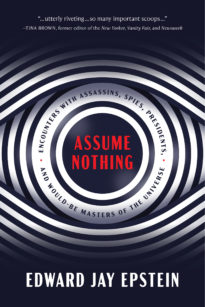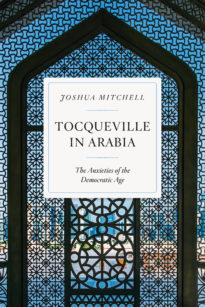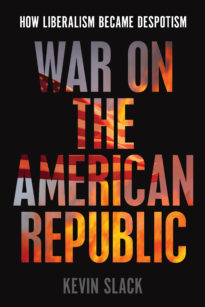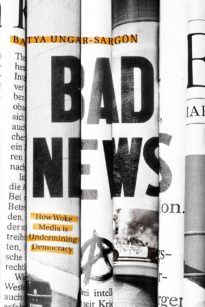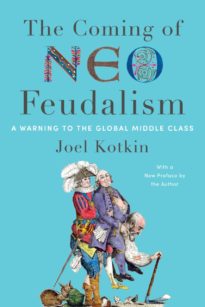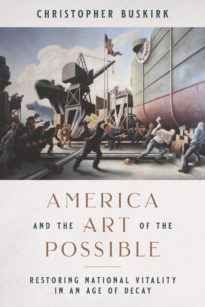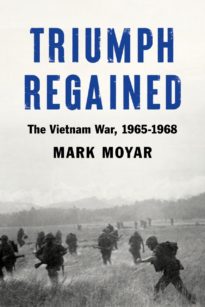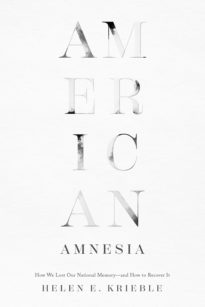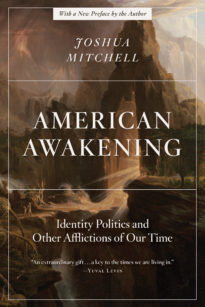Free shipping on all orders over $40
New Releases
The Dictatorship of Woke Capital How Political Correctness Captured Big Business
Over the last century, the Left has been waging a slow, methodical battle for control of the institutions of Western civilization. During most of that time, “business” remained the last redoubt for those who believed in free people, free markets, and private property. In the last two decades, however, that has changed, and the Left has taken its long march to the last remaining non-Leftist institution.
You Report to Me Accountability for the Failing Administrative State
In You Report to Me, Bernhardt provides a firsthand chronicle of how the bureaucratic swamp really works and reveals how unaccountable power has quietly concentrated in the administrative state over the last two decades.
Getting About Travel Writings of William F. Buckley Jr.
Well known as a political commentator and the author of sixteen novels, William F. Buckley Jr. was also a superb chronicler of travel. Getting About gathers more than one hundred of his articles about journeys by boat, train, or plane, representing a lifetime of adventure around the world—from Annapolis to Zurich, from the Azores to the Virgin Islands.
Out of the Melting Pot, Into the Fire Multiculturalism in the World's Past and America's Future
The melting pot has been the prevailing ideal for integrating new citizens through most of America’s history, yet contemporary elites often reject it as antiquated and racist. Instead, they advocate multiculturalism, which promotes ethnic boundaries and distinct group identities. Both models have precedents across the centuries, as Jens Heycke demonstrates in a contribution to the debate that incorporates an international, historical perspective.
The Noise of Typewriters Remembering Journalism
W.H. Auden wrote, “Poetry makes nothing happen.” Journalism is a different matter. In a brilliant study that is, in part, a memoir of his 40 years as an essayist and critic at Time magazine, Lance Morrow returns to the age of typewriters and to the twentieth century’s extraordinary cast of characters—statesmen and dictators, saints and heroes, liars and monsters, and the reporters, editors, and publishers who interpreted their deeds. He shows how journalism has touched the history of the last 100 years, has shaped it, distorted it, and sometimes proved decisive in its outcomes.
And None Shall Make Them Afraid Eight Stories of the Modern State of Israel
Americanism, with freedom and democracy at its core, and Zionism, the movement to create a free and democratic Jewish state, were the two most successful “isms” of the twentieth century. Their adversaries—communism, fascism, and antisemitism—murdered tens of millions. The stories of some of the leaders of the two triumphant movements, however, have in some cases not yet received their full recognition.
This book presents eight individuals—four born or raised in Europe, four in America—whose lives and achievements illustrate the intellectual and social revolutions that Americanism and Zionism brought into the world.
Assume Nothing Encounters with Assassins, Spies, Presidents, and Would-be Masters of the Universe
Curiosity led Edward Epstein to investigate some of the greatest political mysteries of our time, such as the JFK assassination in Dallas, the Vatican banking scandal in Rome, and the diamond cartel in South Africa. Seeking more information, he often found himself a fly on the wall at the highest reaches of the establishment, observing how presidents, tycoons, bankers, and media moguls secretly greased the wheels of power. This memoir recounts his life as a pursuer of lost truths.
Tocqueville in Arabia The Anxieties of the Democratic Age
In America, we know of our growing isolation and loneliness. What of the Middle East? In the Middle East today, citizens and subjects live amid a profound tension: Familial and tribal linkages hold them fast, and at the same time rapid modernization has left them as isolated and lonely as so many Americans are today. The looming question, anticipated so long ago by Tocqueville, is how they will respond to this isolation and loneliness.
War on the American Republic How Liberalism Became Despotism
Americans often use the words progressive, liberal, and radical more or less interchangeably without understanding their place in American history. Kevin Slack describes the distinct aims of the movements they represent and weighs their consequences for the American republic.
Bad News How Woke Media Is Undermining Democracy
Something is wrong with American journalism. Long before “fake news” became the calling card of the Right, Americans had lost faith in their news media. But lately, the feeling that something is off has become impossible to ignore. That’s because the majority of our mainstream news is no longer just liberal; it’s woke. Today’s newsrooms are propagating radical ideas that were fringe as recently as a decade ago, including “antiracism,” intersectionality, open borders, and critical race theory. How did this come to be?
The Coming of Neo-Feudalism A Warning to the Global Middle Class
Liberal capitalism enabled the many to improve their condition and form a robust middle class, but we are reverting to a more stratified society, with concentrated wealth and limited social mobility. A new, higher-tech feudalism is emerging.
America and the Art of the Possible Restoring National Vitality in an Age of Decay
Between 1920 and 1950 America saw an unprecedented expansion of wealth and power underwritten by technological innovation, cultural confidence, and victory in war. American elites won World War II, rebuilt the world order with America at its head, inaugurated the jet age and put a man on the moon. The boom led to a larger, richer middle that confirmed America’s best ideals. By the early 1970s that ended. Since then, American elites have captured a disproportionate share of the social and economic rewards over the last 50 years during which time the middle class has shrunk in size and become economically insecure.
Triumph Regained The Vietnam War, 1965-1968
Triumph Regained: The Vietnam War, 1965-1968 is the sequel to the immensely influential and controversial Triumph Forsaken: The Vietnam War, 1954-1965. Like its predecessor, this book overturns the conventional wisdom using a treasure trove of new sources, many of them from the North Vietnamese side. Rejecting the standard depiction of U.S. military intervention as a hopeless folly, it shows America’s war to have been a strategic necessity that could have ended victoriously had President Lyndon Johnson heeded the advice of his generals.
American Amnesia How We Lost Our National Memory—and How to Recover It
If people, communities, or even nations lose their memory, they lose their character. That is why cultures throughout the world work at maintaining their identity and passing traditions along to future generations. But what if a nation purposely decides it no longer wants to remember its history? Helen Krieble writes that America cannot be preserved as “the last best hope of Earth” if its own people no longer understand why that is true and are no longer willing to do what it takes to preserve it.
American Awakening Identity Politics and Other Afflictions of Our Time
America has always been committed to the idea that citizens can work together to build a common world. Today, three afflictions keep us from pursuing that noble ideal. The first and most obvious affliction is identity politics, which seeks to transform America by turning politics into a religious venue of sacrificial offering.
